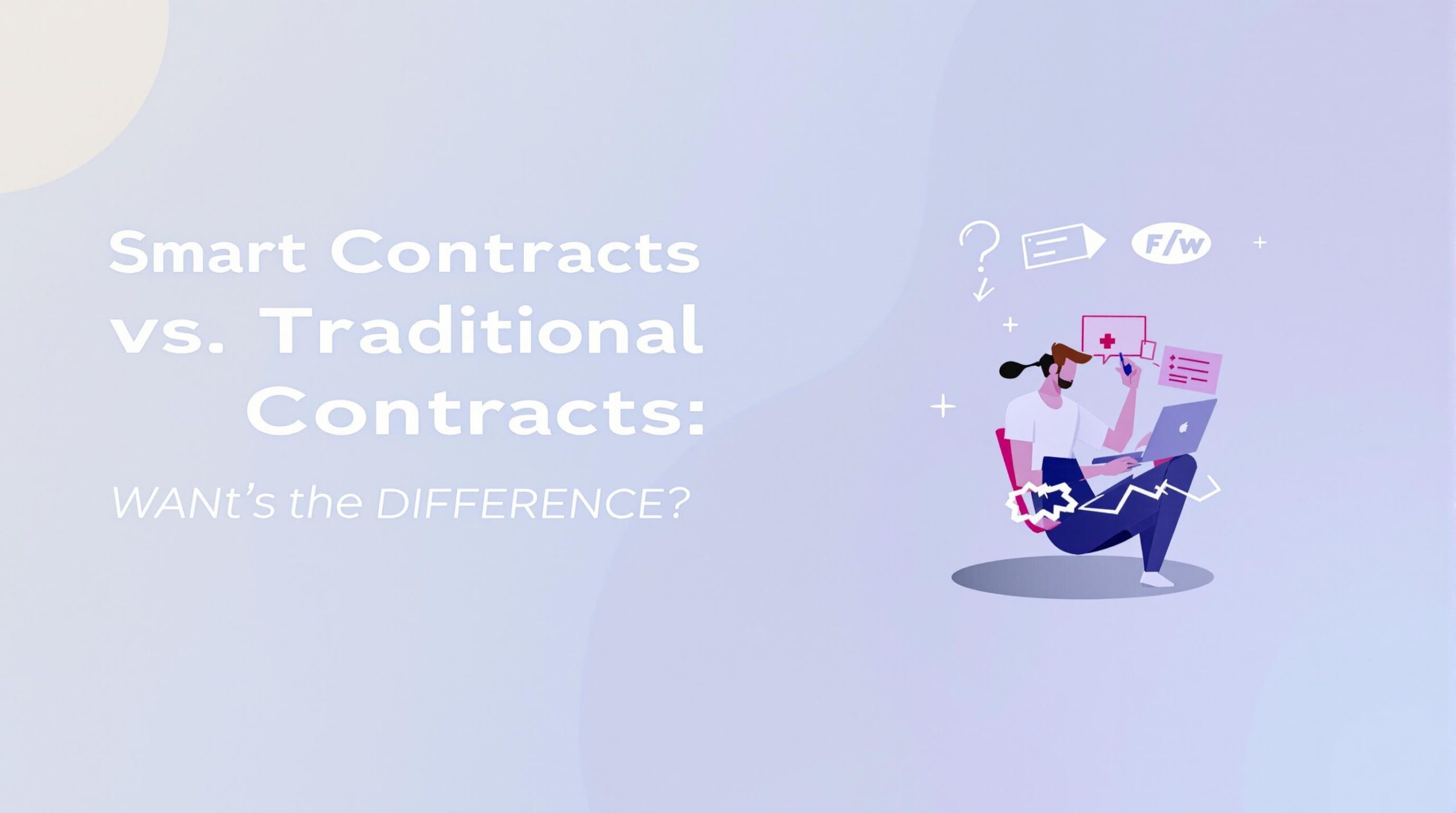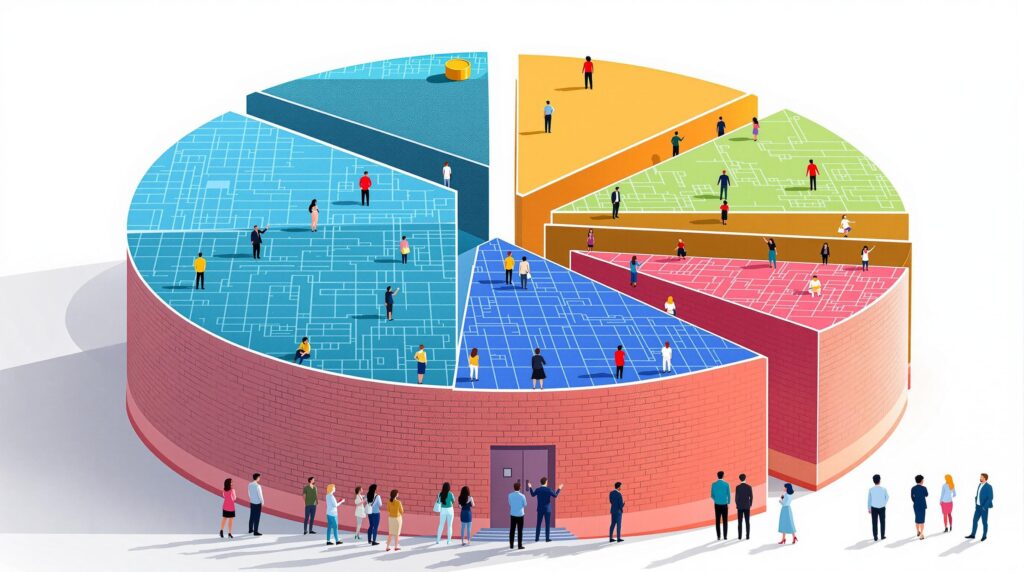Introduction to Smart and Traditional Contracts
Contracts form the backbone of legal and business transactions, facilitating agreements between parties across diverse sectors. As technology advances, so too do the methods of creating and enforcing these agreements. In particular, the rise of smart contracts offers a modern alternative to traditional contracts.
What is a Smart Contract?
Have you ever wondered how a contract could enforce itself without human intervention? Smart contracts are self-executing contracts with the terms of the agreement directly written into lines of code. Operating on blockchain technology, they automatically execute actions when predefined conditions are met. This innovation eliminates the need for intermediaries, enhancing efficiency and reducing costs.
What are smart contracts? Smart contracts are self-executing contracts with the terms of the agreement directly written into lines of code, automating processes on a blockchain.
The Nature of Traditional Contracts
In contrast, traditional contracts are legal agreements established through written or verbal communication. These contracts often involve detailed negotiations and are enforced through legal systems, requiring intermediaries such as lawyers or notaries. Traditional contracts rely heavily on human interpretation and physical proof to uphold their terms.
What defines traditional contracts? Traditional contracts are legal agreements created through negotiations and enforced by legal systems, often necessitating intermediaries and human intervention.
Key Differences and Similarities
When comparing smart and traditional contracts, several differences stand out:
- Automation vs. Manual Process: Smart contracts automate processes without human intervention, whereas traditional contracts require manual oversight and intervention.
- Intermediaries: Smart contracts operate without intermediaries, significantly reducing costs, while traditional contracts typically involve intermediaries to interpret and enforce terms.
- Execution Speed: Smart contracts execute rapidly as soon as conditions are met, contrasting with traditional contracts that may undergo delays due to manual processing.
- Legality and Enforcement: Both types retain legal validity, but their enforcement mechanisms diverge, with traditional contracts relying on legal systems and smart contracts utilizing automated blockchain protocols.
Key difference: Smart contracts automate execution without human intervention, whereas traditional contracts require manual processes involving intermediaries.
Evolution of Contracts in the African Context
In Africa, the adoption of smart contracts is progressing, driven by the region’s rapid embrace of digital solutions and a growing need for efficient, cost-effective transaction methods. Platforms like Jara are at the forefront, leveraging this technology to bridge global capital with African assets. The integration of smart contracts could revolutionize industries such as finance, real estate, and supply chain management by minimizing costs and increasing transparency.
“Invest in $JARA: Fuel Africa’s $200B+ Digital Asset Economy and Participate in a Revolutionary Ecosystem” — Jara bridges the gap between global capital and African assets through innovative solutions.
Practical Applications of Smart Contracts
Consider the scenario where two parties engage in a business transaction. In a traditional setting, they might need a lawyer to draft the contract and oversee its fulfillment. With a smart contract, all specified actions automatically trigger upon meeting predetermined conditions, reducing the need for ongoing oversight.
- Blockchain Implementation: Smart contracts use blockchain technology to securely record and verify transactions.
- Financial Transactions: Automate payouts and settlements without requiring banks as intermediaries.
- Real Estate: Facilitate property transactions by automating the verification of ownership and transfer.
- Supply Chain Management: Improve transparency and efficiency by automatically updating stakeholders at each stage.
Africa’s Path Forward with Smart Contracts
The potential for smart contracts in Africa is substantial, promising enhanced accessibility and financial inclusivity. Companies like Jara play a pivotal role in forming the necessary infrastructure for a digital asset economy. By participating in the $JARA ecosystem, individuals and businesses can engage in increasingly efficient and transparent transactions, contributing to Africa’s ongoing digital revolution.
Africa’s future with smart contracts is bright, marked by enhanced accessibility, financial inclusivity, and the ability to engage in transparent transactions across the continent.
Advantages of Smart Contracts over Traditional Contracts
In the realm of contractual agreements, smart contracts stand out due to several advantages over traditional contracts. By leveraging modern technology, smart contracts enhance efficiency and security, making them highly appealing for businesses in Africa and beyond. Let’s explore these benefits in detail.
Why use a smart contract? Smart contracts automate and enforce contractual terms using code, eliminating intermediaries and reducing the risk of human error.
Automation and Efficiency
One of the most significant advantages of smart contracts is their ability to automate processes that would typically require manual intervention. Automation ensures that actions are executed automatically once predefined conditions are met, without the need for middlemen. This not only speeds up transactions but also reduces administrative costs.
- Streamlined Processes: With smart contracts, processes like verification and execution are embedded within the contract, leading to faster and more efficient operations.
- Reduced Time Delays: The elimination of manual tasks reduces potential delays, ensuring that agreements are fulfilled promptly.
Cost-Effectiveness
Traditional contracts often involve various third parties, such as lawyers and banks, which can result in increased costs. Smart contracts, however, operate on blockchain technology where transactions are automatically verified by the network. This significantly reduces costs associated with hiring intermediaries.
How do smart contracts save money? Smart contracts minimize the need for intermediaries, cutting down costs related to legal and administrative services.
- No Middlemen: With transactions taking place directly between parties, without intermediaries, expenses reduce substantially.
- Lower Fees: Unlike traditional systems, where banking or legal fees can be high, smart contracts incur minimal-to-no fees due to the blockchain’s decentralized nature.
Enhanced Security
Smart contracts are known for their high-security standards. They operate on a blockchain, which is inherently secure and resistant to changes. This ensures that once a contract is deployed, it cannot be altered without consensus.
Blockchain technology makes smart contracts tamper-proof, reducing fraud and manipulation risks, a significant concern for many in Africa’s growing digital economy.
- Immutable Records: Once a smart contract is recorded on the blockchain, it remains unchangeable, providing an accurate and secure record.
- Fraud Prevention: As smart contracts remove intermediaries, there’s a lower risk of manipulation, ensuring fairness and transparency in agreements.
Global Accessibility
Smart contracts offer global reach, which is vital in today’s interconnected world. Especially in Africa, where the digital revolution is bridging gaps in financial services, the user-friendly integration of smart contracts can facilitate international trade and investment without conventional barriers.
- Borderless Transactions: Smart contracts allow transactions across borders without the usual constraints of traditional banking systems.
- 24/7 Availability: Being digital, smart contracts operate around the clock, offering unparalleled convenience to users globally.
The Jara App harnesses these advantages, providing seamless financial services to its users, enhancing accessibility and economic empowerment across Africa.
Through these advantages, smart contracts are proving to be a catalyst for economic growth and innovation, particularly in Africa’s burgeoning financial landscape. As a part of this digital evolution, Jara provides an opportunity for investors to partake in a transformative ecosystem driven by technology and innovation. For those interested in the future of contracts, smart contracts represent not just a trend, but a tangible advancement toward more secure, efficient, and accessible business practices.

Challenges and Limitations of Smart Contracts
Smart contracts are transforming the way we handle agreements, but they’re not without their challenges. While they offer several advantages like automation and transparency, there are certain limitations that potential adopters need to be aware of. So, what are the common challenges associated with smart contracts? Let’s delve into some of these issues, examining both technical and legal aspects in comparison to traditional contracts.
Technical Issues
One of the most prominent challenges is the technological complexity that surrounds smart contracts. Unlike traditional contracts that are based on written terms and mutual consent, smart contracts rely on code and blockchain technology. This means even a minor error in coding can lead to unintended outcomes or vulnerabilities.
- Bug Risks: A single bug in the code can render the contract ineffective or expose it to vulnerabilities. Unlike paper-based contracts, which can be amended relatively easily, fixing smart contract errors can be complicated and expensive.
- Reliance on Oracles: Smart contracts often rely on external data sources known as oracles to trigger contract execution. If these oracles provide inaccurate data, the outcome of the contract could be compromised.
- Scalability Concerns: When deployed on public blockchains, the speed and cost of executing smart contracts can be a concern, especially with the current limitations of blockchain scalability.
In contrast, traditional contracts, though time-consuming to execute manually, don’t have such dependencies on technology and are less vulnerable to technical failures.
Legal Ambiguity
Another significant challenge is the legal status and recognition of smart contracts. While they’re increasingly gaining acceptance, they aren’t universally recognized in the same way traditional contracts are.
- Enforceability: The enforceability of smart contracts across different jurisdictions can be unclear. Since they operate on a decentralized, borderless network, issues arise when dealing with cross-region applications.
- Lack of Legal Precedent: Due to being relatively new, there’s a lack of extensive legal precedents governing smart contracts, which can make legal arbitration or mediation challenging.
Traditional contracts, however, have years of legal precedent and established frameworks, making them more straightforward in terms of legal enforceability and dispute resolution.
Scalability
Smart contracts also face scalability issues due to the limitations inherent in blockchain technology. These issues include network congestion which leads to high transaction costs and slower processing times. Public blockchains, where most smart contracts operate, can become congested as more users engage with the system, straining scalability.
What is the scalability issue with smart contracts? Scalability refers to the ability of the blockchain to handle a growing amount of work, or its potential to accommodate growth. With more nodes participating in a smart contract, the capacity constraints can limit speed and efficiency.
Comparatively, traditional contracts do not face such issues. They are generally limited by human resources and physical logistics rather than technological constraints.
Conclusion and Comparison
In conclusion, while smart contracts offer innovative solutions, they come with their own set of challenges which currently limit their full potential. Technical and legal challenges along with scalability issues can pose significant obstacles, especially when compared to traditional contracts that are simpler to amend and execute but lack the automation and transparency of their digital counterparts.
While Jara is working towards addressing some of these limitations through its blockchain solutions, it remains crucial for businesses and individuals to weigh both the advantages and the potential drawbacks of utilizing smart contracts in today’s evolving digital landscape. If you’re considering delving deeper into these contracts, understanding these limitations will be key to making informed decisions.
The Future of Contracting: Smart Contracts Impact
Have you ever wondered how technology could completely transform legal agreements? Well, the future of contracting is here with smart contracts. As these digital contracts become more prevalent, they are poised to revolutionize various industries. What exactly makes them stand out, and how will they shape the way we do business?
Smart contracts are self-executing contracts with the terms of the agreement directly written into lines of code, offering increased efficiency and security over traditional contracts.
Emerging Trends in Smart Contract Technology
Technology is rapidly evolving, and smart contracts are at the forefront of this change. Let’s explore some emerging trends:
- Increased Adoption in Finance: Many financial institutions are already experimenting with or using smart contracts to automate processes and reduce costs. What makes this trend significant is the potential to streamline complex transactions, paving the way for broader adoption.
- Integration with Internet of Things (IoT): Imagine a world where your appliances can automatically execute agreements based on your usage patterns. Smart contracts could enable IoT devices to transact autonomously, adding a layer of intelligence and efficiency to everyday objects.
- Blockchain Interoperability: As different blockchain platforms emerge, ensuring that they can work together is crucial. New tools and protocols are being developed to allow smart contracts to operate across multiple blockchain networks seamlessly.
Industry analysts predict that by 2030, smart contracts will be standard in sectors ranging from real estate to healthcare, facilitating secure and autonomous transactions.
Potential Developments in Contract Management
The way we manage contracts is changing. With the integration of smart contracts, businesses are set to enjoy various benefits:
| Benefit | Description |
|---|---|
| Automation | Smart contracts automatically execute actions when conditions are met, reducing the need for manual oversight. |
| Accuracy | Once a smart contract is deployed on a blockchain, its terms cannot be altered, promoting accuracy and reducing errors. |
| Transparency | All parties involved have access to the same contract data, increasing transparency and trust. |
“Your Voice, Our Mission” – we champion your rights with the tenacity and dedication that has earned us the trust of our community members.
The Role of Technology in Transforming Contract Management
At the heart of smart contracts is blockchain technology, which ensures the integrity and security of these digital agreements. This transformation is driven by:
- Decentralization: Through the decentralized nature of blockchain, smart contracts eliminate the need for intermediaries, reducing costs and processing times.
- Immutable Records: Once a contract is recorded on the blockchain, it cannot be altered, providing a permanent and tamper-proof record.
- Enhanced Security: The encoded nature of smart contracts ensures that they are highly secure, reducing the risk of fraud and unauthorized access.
In Africa, platforms like $JARA are bridging global capital to African assets through smart contracts, fostering a more inclusive digital economy. By leveraging smart contracts, Africa can overcome infrastructural challenges and expand its market opportunities.
The integration of smart contracts into various sectors will likely reshape how businesses operate. Whether through automating routine processes or providing new avenues for innovation, the potential impact on industry is vast and exciting.
Are you ready to explore the endless possibilities that smart contracts bring to the table? As we move forward, these contracts will not only redefine the legal landscape but also offer unprecedented opportunities for growth and efficiency.

What is the primary difference between smart contracts and traditional contracts?
The primary difference between smart contracts and traditional contracts is that smart contracts are self-executing agreements with terms written directly into code, while traditional contracts rely on legal documentation and external enforcement.
How are smart contracts enforced compared to traditional contracts?
Smart contracts are enforced by the underlying blockchain technology, where their execution is automatic upon fulfilling predefined conditions. Traditional contracts, on the other hand, require human intervention, negotiation, and often judicial processes to enforce terms if disputes arise.
Can smart contracts work in any legal system?
Smart contracts face challenges in working seamlessly across different legal systems due to the lack of standardization and legal recognition in many jurisdictions. They might need additional layers of legal compliance to be fully enforceable in some countries.
What are some potential risks associated with using smart contracts?
Some potential risks of using smart contracts include coding errors, security vulnerabilities, and the rigidity of code, which may not account for unforeseen circumstances. Unlike traditional contracts, making amendments to smart contracts can be complex and costly.

Related Practice Areas We Serve
Explore additional areas related to Smart Contracts and Traditional Contracts that we specialize in:
Discover What Our Clients Are Saying
Our dedication to excellence in Smart Contracts & Automation is evident in every case we undertake. The positive feedback from our clients is a testament to the hard work and dedication we consistently deliver.

Secure Your Future with Smart Contracts: Contact Jara Today!
In today’s fast-paced world, understanding the pivotal differences between smart contracts and traditional contracts can set you apart. Why navigate these complexities alone? At Jara, we specialize in smart contract solutions, offering innovative approaches tailored to your needs. Don’t miss out on the benefits of automation and efficiency—download the Jara app today!
“Your Voice, Our Mission” – at Jara, we bridge global capital to African assets, ensuring your contracts are smart and straightforward.
Recognitions
- Listed among the “Best Contract Law Firms in New York” for 2023 by Expertise – evaluating expertise, client care, and market presence.
- Featured in the “Leading Automation Specialists 2023” by LegalTech Reviews – recognized for our innovation in legal technology.
- Highlighted in the “Premier Digital Asset Firms List 2023” by FinTech Global – acknowledged for our role in bridging technology and finance.
- Ranked among “Top Legal Innovators 2023” by Innovate Legal Awards – endorsed for our cutting-edge approaches in contract automation.
- Named in the “Asian Legal Vanguard 2023” list by Legal Asia – celebrating firms transforming the Asian legal landscape.
Ready to revolutionize your contract processes? Connect with us now and explore the future of smart contracts with Jara.
Chinyere “Chi” Nnadi Bio
Founder and CEO, Jara | Contract Law Specialist
Content Reviewed by Chi Nnadi and his Content Team. Chi is an experienced entrepreneur dedicated to transforming Africa’s financial ecosystem through blockchain technology. As Founder and CEO of Jara, he builds enterprise-grade infrastructure converting illiquid African assets into globally accessible digital tokens. With his proprietary Layer-2 blockchain technology and expertise in contract law, Chi bridges the gap between global investors and Africa’s growing digital asset market.

















